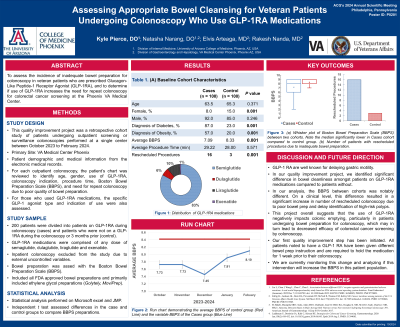Sunday Poster Session
Category: Colon
P0201 - Assessing Appropriate Bowel Cleansing For Veteran Patients Undergoing Colonoscopy Who Use GLP-1 Agonist Medications
Sunday, October 27, 2024
3:30 PM - 7:00 PM ET
Location: Exhibit Hall E

Has Audio

Kyle Pierce, DO
University of Arizona College of Medicine, Phoenix VA Medical Center
Phoenix, AZ
Presenting Author(s)
Kyle Pierce, DO1, Elvis J. Arteaga, MD2, Natasha Narang, DO1, Rakesh Nanda, MD, FACG3
1University of Arizona College of Medicine, Phoenix VA Medical Center, Phoenix, AZ; 2University of Arizona College of Medicine, Phoenix, AZ; 3Carl T. Hayden Veterans' Administration Medical Center, Phoenix, AZ
Introduction: Effective bowel preparation is essential prior to a colonoscopy to optimize the detection of CRC and precancerous colon polyps, and is an important quality metric for colonoscopy. Glucagon-like peptide-1 receptor agonists (GLP-1 RA) are currently approved for the management of weight loss and diabetes, and used frequently amongst the Veteran population. Though effective, GLP-1 RA medications have numerous gastrointestinal side effects, including delayed gastrointestinal motility. We aimed to assess the incidence of inadequate bowel preparation for colonoscopy in patients who are prescribed GLP-1 RA, and to determine if use of GLP-1 RA increases the need for repeat colonoscopy in Veteran patients at the Phoenix VA Medical Center.
Methods: This quality improvement project was a retrospective review of colonoscopies performed between January to February 2023 . For each colonoscopy, the chart was reviewed to identify age, gender, use of GLP-1 RA, colonoscopy indication, procedure time, Boston Bowel Preparation Score (BBPS), documented adequacy of bowel preparation and need for repeat colonoscopy due to quality of bowel preparation. For those who used GLP-1 RA medications, the specific GLP-1 RA type and indication of use were also assessed.
Results: A total of 200 patients underwent colonoscopy during the observed period. Of this, 101 were using GLP-1 RA medications, and 99 were not using GLP-1 RA medications. The average age amongst patients was 65.3 in the GLP-1 RA group, and 63.5 in the group without. The average BBPS was significantly lower in the GLP-1 cohort at 7.09 compared to 8.33 (p < .01). Notably, a significant amount of patients in the GLP-1 RA cohort required repeat colonoscopy due to poor bowel 17 prep compared to the non-GLP-1 RA group.
Discussion: GLP-1 RA are well known for delayed gastric motility. In our quality improvement project, a significant difference in bowel cleanliness for colonoscopy amongst patients on GLP-1 RA medications compared to patients without. In our analysis, the BBBPS between cohorts was notably different. On a clinical level, this difference resulted in a significant increase in number of rescheduled colonoscopy due to poor bowel prep and delay identification of high-risk polyps. This project overall suggests that the use of GLP-1 RA negatively impacts colonic emptying, particularly in patients undergoing bowel preparation for colonoscopy, which may lead to decreased efficacy of colorectal cancer screening by colonoscopy.
Disclosures:
Kyle Pierce, DO1, Elvis J. Arteaga, MD2, Natasha Narang, DO1, Rakesh Nanda, MD, FACG3. P0201 - Assessing Appropriate Bowel Cleansing For Veteran Patients Undergoing Colonoscopy Who Use GLP-1 Agonist Medications, ACG 2024 Annual Scientific Meeting Abstracts. Philadelphia, PA: American College of Gastroenterology.
1University of Arizona College of Medicine, Phoenix VA Medical Center, Phoenix, AZ; 2University of Arizona College of Medicine, Phoenix, AZ; 3Carl T. Hayden Veterans' Administration Medical Center, Phoenix, AZ
Introduction: Effective bowel preparation is essential prior to a colonoscopy to optimize the detection of CRC and precancerous colon polyps, and is an important quality metric for colonoscopy. Glucagon-like peptide-1 receptor agonists (GLP-1 RA) are currently approved for the management of weight loss and diabetes, and used frequently amongst the Veteran population. Though effective, GLP-1 RA medications have numerous gastrointestinal side effects, including delayed gastrointestinal motility. We aimed to assess the incidence of inadequate bowel preparation for colonoscopy in patients who are prescribed GLP-1 RA, and to determine if use of GLP-1 RA increases the need for repeat colonoscopy in Veteran patients at the Phoenix VA Medical Center.
Methods: This quality improvement project was a retrospective review of colonoscopies performed between January to February 2023 . For each colonoscopy, the chart was reviewed to identify age, gender, use of GLP-1 RA, colonoscopy indication, procedure time, Boston Bowel Preparation Score (BBPS), documented adequacy of bowel preparation and need for repeat colonoscopy due to quality of bowel preparation. For those who used GLP-1 RA medications, the specific GLP-1 RA type and indication of use were also assessed.
Results: A total of 200 patients underwent colonoscopy during the observed period. Of this, 101 were using GLP-1 RA medications, and 99 were not using GLP-1 RA medications. The average age amongst patients was 65.3 in the GLP-1 RA group, and 63.5 in the group without. The average BBPS was significantly lower in the GLP-1 cohort at 7.09 compared to 8.33 (p < .01). Notably, a significant amount of patients in the GLP-1 RA cohort required repeat colonoscopy due to poor bowel 17 prep compared to the non-GLP-1 RA group.
Discussion: GLP-1 RA are well known for delayed gastric motility. In our quality improvement project, a significant difference in bowel cleanliness for colonoscopy amongst patients on GLP-1 RA medications compared to patients without. In our analysis, the BBBPS between cohorts was notably different. On a clinical level, this difference resulted in a significant increase in number of rescheduled colonoscopy due to poor bowel prep and delay identification of high-risk polyps. This project overall suggests that the use of GLP-1 RA negatively impacts colonic emptying, particularly in patients undergoing bowel preparation for colonoscopy, which may lead to decreased efficacy of colorectal cancer screening by colonoscopy.
Disclosures:
Kyle Pierce indicated no relevant financial relationships.
Elvis Arteaga indicated no relevant financial relationships.
Natasha Narang indicated no relevant financial relationships.
Rakesh Nanda indicated no relevant financial relationships.
Kyle Pierce, DO1, Elvis J. Arteaga, MD2, Natasha Narang, DO1, Rakesh Nanda, MD, FACG3. P0201 - Assessing Appropriate Bowel Cleansing For Veteran Patients Undergoing Colonoscopy Who Use GLP-1 Agonist Medications, ACG 2024 Annual Scientific Meeting Abstracts. Philadelphia, PA: American College of Gastroenterology.
